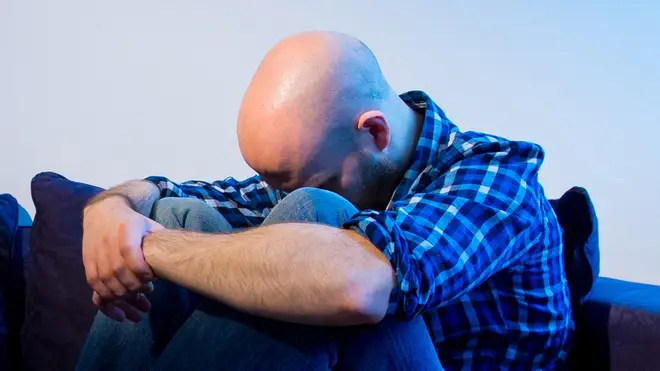
Ian Payne 4am - 7am
1 September 2020, 17:30

The number of men taking their own lives has reached its highest rate for two decades, new data has revealed.
There were 5,691 suicides recorded in England and Wales last year, with men accounting for 4,303 cases - around three-quarters of the total.
This compares with 1,388 women, according to the data published on Tuesday by the Office for National Statistics (ONS).
At a rate of 16.9 male suicides per 100,000 people, this marks the highest figure since 2000, while still remaining in line with the rate reported in 2018.
READ MORE: 'More wretched Covid to come, but UK is getting back on its feet', says Boris Johnson
The ONS noted that men aged 45 to 49 were at a particular risk with 25.5 deaths per 100,000 males, which could be due to economic hardship, isolation and alcoholism.
Men in this category, it added, would also be less likely to seek help.
READ MORE: Treating diabetics 'relatively easy' with new NHS weight loss scheme, says scientist
Meanwhile, the data showed that suicide rates for women were at their highest since 2004, with 5.3 deaths per 100,000.
The rate among women aged between 10 and 24 had specifically been found to have increased "significantly" from 1.6 deaths per 100,000 in 2012 to 3.1 deaths per 100,000 women in the same age group last year.
Geographically, Yorkshire and Humber registered the highest rates in 2019, with 20.6 deaths per 100,000 men and 7.3 per 100,000 women, while the South East had also increased "significantly" in its rates.

The emotional caller who perfectly explained what depression is like
The ONS has also published provisional data revealing 6.9 suicides per 100,000 people during the peak of the pandemic between April and June this year.
This marks the lowest of any quarter since 2001 - but the ONS has warned that the low number would likely be due to inquests being delayed amid the outbreak.
Such results, it said, should be approached with "caution" as all suicides are investigated by coroners who have their had their jobs impacted by COVID-19.
The ONS added: "Given the length of time it takes to hold an inquest (around five months), we do not currently know the total number of suicides that occurred during the coronavirus (COVID-19) pandemic."
READ MORE: Bolton Council asks for town to remain in lockdown
Samaritans chief executive Ruth Sutherland said that while it's not inevitable that suicide rates would rise as a result of lockdowns, there had still been a noticeable impact on anxiety and distress.
She said: "Volunteers are telling us that many callers have been worried about losing their job and/or business and their finances, with common themes around not being able pay rent/mortgage, inability to support the family, and fear of homelessness.
"Undoubtedly, the pandemic has affected everyone in society, but Samaritans is particularly worried about three groups: people with pre-existing mental health conditions, young people who self-harm, and less well-off middle-aged men.
"It is essential that these groups are given the support they need before people reach crisis point.
"Suicide prevention must be a priority right now, so we can save lives."
If you are affected by any of the above and need emotional support then contact the Samaritans helpline 24 hours a day on 116 123, email jo@samaritans.org, visit a Samaritans branch or visit their website.